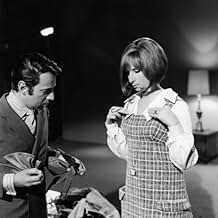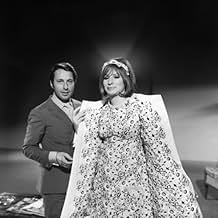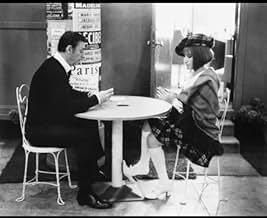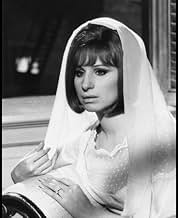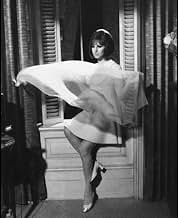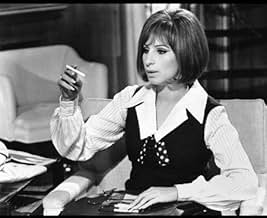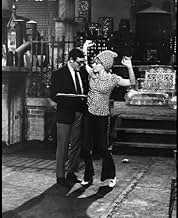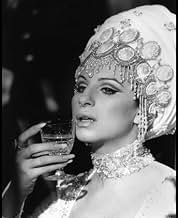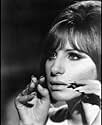IMDb RATING
6.4/10
4.6K
YOUR RATING
A troubled young woman who visits a psychotherapist to help her quit smoking undergoes hypnosis and finds herself reliving a tragic Victorian romance from a past life.A troubled young woman who visits a psychotherapist to help her quit smoking undergoes hypnosis and finds herself reliving a tragic Victorian romance from a past life.A troubled young woman who visits a psychotherapist to help her quit smoking undergoes hypnosis and finds herself reliving a tragic Victorian romance from a past life.
- Director
- Writer
- All cast & crew
- Production, box office & more at IMDbPro
6.44.5K
1
2
3
4
5
6
7
8
9
10
Featured reviews
Pleasant musical
This is one of those musicals that rarely gets talked about. Even the original stage version is not as well known as say, "Oklahoma!" or "West Side Story", but it should be. It has some wonderful music and an intriguing story.
However, comparing the stage version of this show with the film would be pointless, because all filmed musicals of Broadway shows usually change in more then a few ways. As for this film, it is a charming watch, and an enjoyable way to spend a couple of hours. You don't need to be fans of either of the lead actors, but it does help if you are a musical fan and are somewhat interested in the science of ESP.
The songs in this film are all great, not one of them are what I would consider "filler". A few of the original songs from the stage show have been replaced here with different pieces, but they are good ones nontheless. My only complaint in them is Yves Montand's singing. It's difficult enough to understand his spoken word, but it's even worst when he sings. John Cullum's singing in the original Broadway version is so clear and strong, and Montand is just not at par with that. Still, the quality of the songs themselves, make up for this. The Technicolor is stupendous, lusch and vivid. It's a shame that the film was cut so badly before it was released. Not having seen that version, it's difficult for me to say whether or not it would have been an improvement over the finished product, but I doubt it. As it is, this is a decent, pleasant musical film, and worth watching if you are a fan of the genre.
However, comparing the stage version of this show with the film would be pointless, because all filmed musicals of Broadway shows usually change in more then a few ways. As for this film, it is a charming watch, and an enjoyable way to spend a couple of hours. You don't need to be fans of either of the lead actors, but it does help if you are a musical fan and are somewhat interested in the science of ESP.
The songs in this film are all great, not one of them are what I would consider "filler". A few of the original songs from the stage show have been replaced here with different pieces, but they are good ones nontheless. My only complaint in them is Yves Montand's singing. It's difficult enough to understand his spoken word, but it's even worst when he sings. John Cullum's singing in the original Broadway version is so clear and strong, and Montand is just not at par with that. Still, the quality of the songs themselves, make up for this. The Technicolor is stupendous, lusch and vivid. It's a shame that the film was cut so badly before it was released. Not having seen that version, it's difficult for me to say whether or not it would have been an improvement over the finished product, but I doubt it. As it is, this is a decent, pleasant musical film, and worth watching if you are a fan of the genre.
A truly fine, fine film.
On A Clear day You can See Forever is truly a wonderful, feel good movie. Barbra Streisand's portrayl of Daisy Gamble is absolutely endearing. The character of Daisy is so sweet and child-like, and at the same time cooky and hysterically clumsy. In the very same movie she also portrays a sophisticated seductress of Brittish decent from the 19th century. Completely the opposite of her Daisy Gamble character. Daisy goes to see a doctor to help her quit smoking and while under hypnosis reveals the personality of Melinda, the Brittish seductress. Her doctor falls for Melinda, but is not in any way interested in Daisy in a romantic way. However, Daisy thinks the doctor is falling in love with her, and she certainly is falling in love with him. It is this plot, combined with the movies vivid color and great songs, as well as Barbra's wonderful dimmensions of acting in this film, and a terrific supporting cast, that make it such a treat to watch. By the end of the movie, you TRULY, REALLY "FEEL" Daisy's sense of feeling better about herself and loving herself for who she is. Although I have enjoyed Barbra's other musicals,(some more than others),this one is the only one that, I feel, truly leaves you with a sense of wonderment. On A Clear day You Can See Forever is an EXCELLENT, WONDERFUL movie. A visual and audial treat. Enjoy it.
Masterly coda to one of Hollywood's greatest careers.
ON A CLEAR DAY opens with two extraordinary sequences. Firstly, with Babs singing the title song, there is a montage of flowers growing at speed in front of our very eyes, a decisively Minnellian melange of colour and artifice to create a real eye-dazzlingly emotional explosion which reaches an ecstatic crescendo as Babs skips through a maze of floral abundance. This is followed by a chilling, antithetical credits sequence, a VERTIGOesque assembly-line of diminishing rectangles in cool, gorgeous colours, in which the familiar Broadway music feels distorted and distant.
These two sequences encapsulate the film's conflict - between heart and mind; emotion and intellect; freedom and order; dream and reality; self-expression and conformity. In 1970, the age of BONNIE AND CLYDE, M*A*S*H and WOODSTOCK, a Minnelli/Lerner/Streisand musical must have seemed amusingly quaint, but today, we can marvel at its audacity and flair, while many of its more acclaimed contemporaries seem tinny and shrill.
The narrative proper seems initially mundane after such abstract excess. Daisy Gamble (perfect name!) interrupts a lecture by famed psychologist, Marc Chabot, being accidentally hypnotised as he demonstrates on a pupil. She is a scatty, ditzy loudmouth who has come to Chabot in the hope that he will manipulate her out of a 5-packs a day smoking habit to please her ultra-conformist fiance, Warren, who has a career-crucial business dinner.
Chabot has little interest in this clumsy pest until he discovers that she has some psychic powers. Intrigued, he explores her through hypnosis and discovers her past-life as a supremely resourceful, sexually magnetic, orphaned Cockey golddigger of the Regency, who is standing trial for espionage and treason, her caddish husband having deserted her. Chabot begins to fall in love with this remarkable woman, and believing, against all his rationalist principles, in reincarnation.
Even by Minnelli's standards, this is a bravely open-ended picture, not only in its unexpected denouenment, but in refusing to simplify the bewildering, complicated emotions his characters become prey to. On a simple structural level, he contrasts conformity with the life of emotion and imagination. Chabot is a doctor whose devotion to science and facts is almost monkish in its celibate form. His office is the embodiment of conformity, a bland brown pervading walls, chairs, fittings, barred windows, books, even his own clothes. Despite being Yves Montand, he is no French lover.
Into his life comes this impossible woman whose striving for fiance-pleasing order results in further chaos. In her second incarnation, as Melinda, she brings bawdiness, vulgarity, romance, humour, daring, but, most of all, colour, sumptuous, ravishing, blinding colour. The effect she has on Chabot is reflected in the film's form, which moves from steady, mid-level, classical compositions, to outrageous fancy, dizzying camera movements, mercurial editing cutting across time and space. Chabot soon begins to have Daisy's dreams, while she becomes divided from herself in a remarkable visualisation of the split between duty and desire.
But it's not enough to suggest simplistic dichotomies - even the 'normal' Daisy has a rooftop garden which is simply magical (isn't that such a lovely idea, a woman who makes flowers grow quickly by talking to them?), while her fiance, like Darrin from BEWITCHED, is so desperate to conform that he becomes mad. 'Sciences', such as psychoanalysis are invoked in the spirit of the times, but the Pandora's Box they open in no way 'explain', but sets free, as Chabot ruefully recognises.
This is all significantly gendered as men try to control and explain a woman who darts gleefully through history, place, morality, while barely taking a break. As ever with Minnelli, the celebration of artifice only reveals how repressive real-life is, and his satire is cutting if you care to look. This is an undervalued, joyous, sad coda to one of Hollywood's greatest careers (Minnelli would go on to make only one more movie), as full of invention and love as his first film, CABIN IN THE SKY.
The music is fine, with little of the heartache as GIGI or fun of MY FAIR LADY. Montand is charming in a thankless role, but Barbara Streisand - and, God help me, I never thought I'd say this - is an absolute joy in a double (treble?) role, especially convincing in saucy period dress, yet, moving when she needs to be.
These two sequences encapsulate the film's conflict - between heart and mind; emotion and intellect; freedom and order; dream and reality; self-expression and conformity. In 1970, the age of BONNIE AND CLYDE, M*A*S*H and WOODSTOCK, a Minnelli/Lerner/Streisand musical must have seemed amusingly quaint, but today, we can marvel at its audacity and flair, while many of its more acclaimed contemporaries seem tinny and shrill.
The narrative proper seems initially mundane after such abstract excess. Daisy Gamble (perfect name!) interrupts a lecture by famed psychologist, Marc Chabot, being accidentally hypnotised as he demonstrates on a pupil. She is a scatty, ditzy loudmouth who has come to Chabot in the hope that he will manipulate her out of a 5-packs a day smoking habit to please her ultra-conformist fiance, Warren, who has a career-crucial business dinner.
Chabot has little interest in this clumsy pest until he discovers that she has some psychic powers. Intrigued, he explores her through hypnosis and discovers her past-life as a supremely resourceful, sexually magnetic, orphaned Cockey golddigger of the Regency, who is standing trial for espionage and treason, her caddish husband having deserted her. Chabot begins to fall in love with this remarkable woman, and believing, against all his rationalist principles, in reincarnation.
Even by Minnelli's standards, this is a bravely open-ended picture, not only in its unexpected denouenment, but in refusing to simplify the bewildering, complicated emotions his characters become prey to. On a simple structural level, he contrasts conformity with the life of emotion and imagination. Chabot is a doctor whose devotion to science and facts is almost monkish in its celibate form. His office is the embodiment of conformity, a bland brown pervading walls, chairs, fittings, barred windows, books, even his own clothes. Despite being Yves Montand, he is no French lover.
Into his life comes this impossible woman whose striving for fiance-pleasing order results in further chaos. In her second incarnation, as Melinda, she brings bawdiness, vulgarity, romance, humour, daring, but, most of all, colour, sumptuous, ravishing, blinding colour. The effect she has on Chabot is reflected in the film's form, which moves from steady, mid-level, classical compositions, to outrageous fancy, dizzying camera movements, mercurial editing cutting across time and space. Chabot soon begins to have Daisy's dreams, while she becomes divided from herself in a remarkable visualisation of the split between duty and desire.
But it's not enough to suggest simplistic dichotomies - even the 'normal' Daisy has a rooftop garden which is simply magical (isn't that such a lovely idea, a woman who makes flowers grow quickly by talking to them?), while her fiance, like Darrin from BEWITCHED, is so desperate to conform that he becomes mad. 'Sciences', such as psychoanalysis are invoked in the spirit of the times, but the Pandora's Box they open in no way 'explain', but sets free, as Chabot ruefully recognises.
This is all significantly gendered as men try to control and explain a woman who darts gleefully through history, place, morality, while barely taking a break. As ever with Minnelli, the celebration of artifice only reveals how repressive real-life is, and his satire is cutting if you care to look. This is an undervalued, joyous, sad coda to one of Hollywood's greatest careers (Minnelli would go on to make only one more movie), as full of invention and love as his first film, CABIN IN THE SKY.
The music is fine, with little of the heartache as GIGI or fun of MY FAIR LADY. Montand is charming in a thankless role, but Barbara Streisand - and, God help me, I never thought I'd say this - is an absolute joy in a double (treble?) role, especially convincing in saucy period dress, yet, moving when she needs to be.
Knock it off peeps!
Frankly, I think the discussion of this movie will never end. We don't know what director's cut was like...may have been better or worse. The release was just bad timing. and there was no appetite for this in the "movie going" public.
It is a dinosaur.
Streisand was at her best in this film. Montand wasn't awful, just miscast. I recently watched some of his other movie performances, and was left with a question about the appeal that folks had in him to begin with. The music/songs were only brought to life by Streisand....who else could have held your interest in the lyrics? If this had been released before "Hello Dolly" it would have been a hit. Instead, it made Streisand look like a "one-trick-pony".
Director V.Minnelli was the right choice, in my opinion, and any adaption from stage to screen is always risky. Especially with a musical. No matter how you feel about this movie, try to imagine it without her. Who could pull it off? Your answers will thrill me.
I think, all in all, it was just made at the wrong time. When I watch it now, I feel very nostalgic about the past. Yeah! It was cool to have your bedding match your nightgown!
It is a dinosaur.
Streisand was at her best in this film. Montand wasn't awful, just miscast. I recently watched some of his other movie performances, and was left with a question about the appeal that folks had in him to begin with. The music/songs were only brought to life by Streisand....who else could have held your interest in the lyrics? If this had been released before "Hello Dolly" it would have been a hit. Instead, it made Streisand look like a "one-trick-pony".
Director V.Minnelli was the right choice, in my opinion, and any adaption from stage to screen is always risky. Especially with a musical. No matter how you feel about this movie, try to imagine it without her. Who could pull it off? Your answers will thrill me.
I think, all in all, it was just made at the wrong time. When I watch it now, I feel very nostalgic about the past. Yeah! It was cool to have your bedding match your nightgown!
My All Time Favorite Movie
Okay, granted you have to like Barbra Streisand to love this movie. But for those of you who don't, it's worth a catch just to see Bob Newhart and Jack Nicholson as "young" men. Jack is especially funny in his short scenes with Barbra and her fiancée...
But the main reason to see this flick is the acting and musical talent of Barbra. She has to STRETCH to play a mousy crowd follower, and then switch it up to play a haughty wealthy socialite in a past time period. The costumes are out of this world, and the film should have won an academy award for costume design, although Barbra's figure did her costumes justice. The periods in history represented by the film are stunningly presented. All in all, this is my favorite movie of all time. There is laughter, sorrow, drama, singing, dancing, lots of Barbra skin showing, sexuality, scorn, mocking, a panorama of events and celebrations and Barbra's eventual awakening as her own person. I salute Vicente Minnelli, post mortem.
But the main reason to see this flick is the acting and musical talent of Barbra. She has to STRETCH to play a mousy crowd follower, and then switch it up to play a haughty wealthy socialite in a past time period. The costumes are out of this world, and the film should have won an academy award for costume design, although Barbra's figure did her costumes justice. The periods in history represented by the film are stunningly presented. All in all, this is my favorite movie of all time. There is laughter, sorrow, drama, singing, dancing, lots of Barbra skin showing, sexuality, scorn, mocking, a panorama of events and celebrations and Barbra's eventual awakening as her own person. I salute Vicente Minnelli, post mortem.
Did you know
- TriviaAccording to the 1974 biography "Barbra Streisand: The First Decade", this was originally envisioned as a three-hour "road show" extravaganza, and included many sequences of Daisy's other lives (photos of which were printed in some pre-release promotions), but director Vincente Minnelli and the studio felt it would be too long, especially since musicals had already begun to fail at the box office. In addition to all but the briefest of Jack Nicholson's scenes being cut, a musical number sung by him and Streisand, "Who Is There Among Us Who Knows?," was also cut, as well as "Wait Till We're Sixty-Five," a duet between Larry Blyden and Barbra Streisand. Producer Howard W. Koch conducted a search for the deleted footage in 1994, particularly Nicholson's song, which he wanted to showcase during the AFI tribute to the actor. Nothing turned up at Paramount. Koch asked Streisand and Minnelli's widow if they had remnants of the cut footage, but neither did. Koch determined that if the film still exists, it's probably in a mislabelled canister.
- GoofsThe telephone ring in Chabot's office is not a typical Bell company ring, even though the story is supposedly set in New York.
- Quotes
Dr. Marc Chabot: I used to be in love with answers, but since I've known you I'm just as astounded by questions. Answers make you wise, questions make you human.
- ConnectionsFeatured in Paramount Presents (1974)
- How long is On a Clear Day You Can See Forever?Powered by Alexa
Details
Box office
- Budget
- $10,000,000 (estimated)
- Gross US & Canada
- $14,000,000
- Gross worldwide
- $14,000,000
Contribute to this page
Suggest an edit or add missing content

